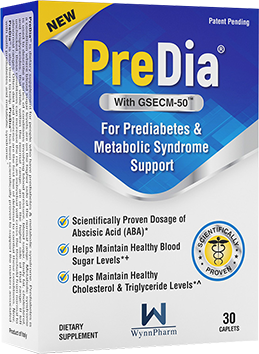
We're here when you need us!
Call: (800) 214-9600
Email: info@wynnpharm.com
PreDia Frequently Asked Questions
PreDia addresses the need of people with one or more of the following risk factors linked to prediabetes and /or metabolic syndrome:
- Fasting glycemia ≥ 100 mg/dl which reveals a situation of impaired fasting glucose (IFG)
- Glycated hemoglobin (HbA1c) ranging 5.6% and 6.5% which reveals a situation of impaired glucose tolerance (IGT)
- Total cholesterol ≥ 200 mg/dl or LDL-C ≥ 100 mg/dl or HDL-C ≤ 35 mg/dl or triglycerides > 150 mg/dl
- Obesity or evident overweight
- Blood pressure ≥ 130/85 mmHg or under antihypertensive therapy
- Cardiovascular problems
- History of gestational diabetes or familiarity with Type 2 diabetes
PreDia intake, associated with a healthy lifestyle, can help you in the optimal management of sugars and lipids metabolism thus helping to alleviate the conditions of both prediabetes and metabolic syndrome.
PreDia works by controlling glycemia (sugar levels in the blood) either by delaying or reverting the onset of impaired fasting Glucose (IFG) and impaired Glucose tolerance (IGT) which are typically associated with prediabetic conditions.
What is PreDia's mode of action?
Impaired fasting Glucose and impaired Glucose tolerance lead to progressive insulin resistance due to the higher amounts of insulin (the hormone released by beta pancreatic cells to restore normal blood sugar levels) needed to normalize glycemia. PreDia exerts its action on glycemic control not by increasing but by sparing insulin secretion to reduce glycemia after a meal. The capability of saving insulin secretion to control glycemia represents the most important mode of action of PreDia by prolonging the life-span of beta cell and their possibility to release insulin.
Are there any studies done on PreDia?
Recently has been submitted for a publication the first clinical study on human subjects who took 1 cap per day of PreDia for 75 days. The results of this trial shows:
- significant reduction of fasting glycemia and glycated hemoglobin
- significant reduction of total cholesterol
- significant reduction of body mass index and waist circumference
- significant reduction of cardiovascular risk
- significant increase of cardiovascular protection
Moreover, some scientific studies about the great benefit exerted by the main ingredient in PreDia (i.e. abscisic acid) on glucose and lipid metabolism are published. What makes our abscisic acid (ABA) unique is that we use an optimal dosage range that includes a patent pending formula.
Do I need to speak to my doctor before taking PreDia?
Although PreDia is safe and it is not a drug, as with any nutritional product please consult your physician before taking it. This would allow your physician to place PreDia information in context to your unique conditions.
How long do I need to take PreDia before I see any results?
Considering the results obtained in the clinical study performed with PreDia, it is suggested to take it for 3 months. During this period, to achieve optimal results, you have to combined PreDia intake with a healthy lifestyle (proper diet and mild physical activity).
Once I see benefits, do I stop taking PreDia or should I continue taking it?
As PreDia helps in glucose and lipid metabolism management, it can continue to be beneficial for you as long as you take it. However, it is advised you speak to your physician so they may advise when to stop or when to continue.
Is the product safe and there are any side effects?
PreDia is safe and no side effects have been reported by the subjects involved in the clinical study.
Are there any interactions with other medications?
Interactions with other medications were not evaluated during the clinical study. It is advised you speak to your physician who best knows your medication history.
What makes PreDia different than others?
PreDia is different than other food supplements already commercially available for glycemic management because is the only one containing the scientifically proven dosage of abscisic acid (ABA). Thanks to its ABA content, PreDia allows a normal absorption of carbohydrates by promoting their use for energy purposes without increasing insulin secretion and the consequently body fat accumulation.
Why I haven't heard of PreDia before?
PreDia is a new and revolutionary dietary supplement to support people who have prediabetes and metabolic syndrome.
It is a source of the scientifically proven dosage of abscisic acid (ABA) made of Grape seed extract, chromium and magnesium.
Abscisic acid (ABA) is a molecule present in vegetal, havingat the optimal dose contained in PreDia, the scientifically proven capability to counteract the onset of insulin resistance in humans, i.e. the condition for the development of both prediabetes and metabolic syndrome. Indeed, scientific studies have shown that the dose of ABA contained in GSECM-50TM can significantly reduce:
- Fasting glycemia and glycated hemoglobin
- Glycemic profile after a meal
- The insulin level needed to normalize glycemia after a meal
- Cholesterol and triglycerides levels
- Body weight gain
All of the above parameters, when higher than normal, are markers of prediabetes and of metabolic syndrome. The optimal dose of ABA contained in PreDia's formulation allows to control all these parameters through a normal absorption of carbohydrates without increasing insulin secretion.
The fact that the scientifically proven dosage of ABA contained in PreDia is not an insulin-secretagogue sets ABA apart from most other currently employed products and ingredients with glycemia-lowering action, which conversely stimulate insulin release to normalize glycemia and may therefore accelerate the demise of the beta cell population that eventually occurs in T2D, due to the life-long overstimulation of insulin secretion.
